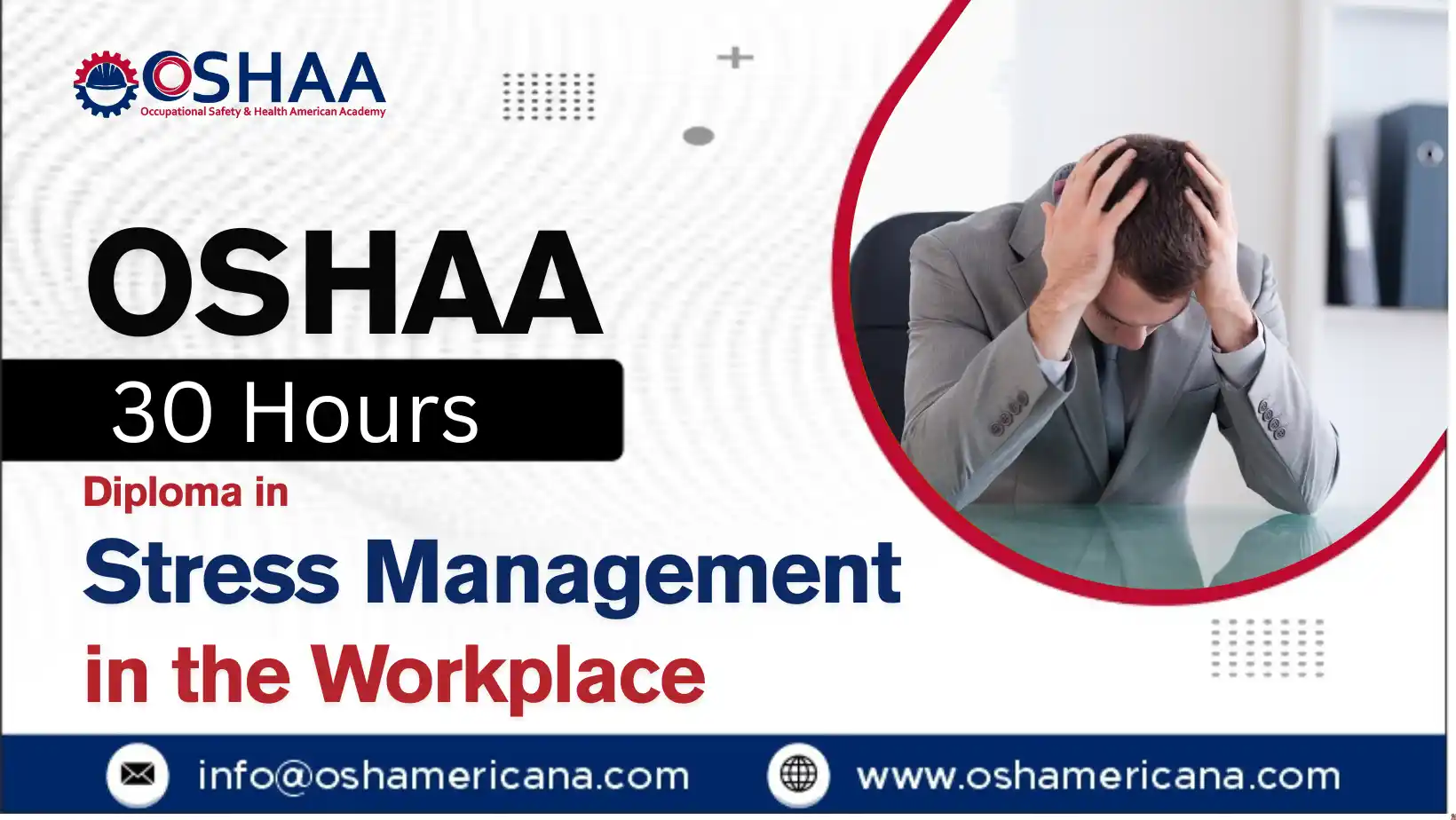Master Workplace Wellbeing with Diploma in Stress Management
Workplace stress continues to be one of the most significant challenges to productivity, mental wellbeing, and employee retention across various industries. The OSHAA 30-Hours Diploma in Stress Management in the Workplace provides participants with the essential knowledge and practical strategies needed to identify, manage, and prevent stress in professional environments. This course is tailored to UK standards and is highly relevant for those responsible for maintaining a healthy and supportive workplace.
With mental health becoming an increasing priority within organisations, this professionally designed programme equips participants to understand stress not only as a personal issue but as a workplace phenomenon influenced by systems, communication, and organisational culture. Whether working in HR, management, or a frontline support role, participants will leave this course with tools that can make a measurable difference in reducing stress and promoting resilience.
This 30-hour diploma offers an in-depth, evidence-based exploration of workplace stress. It covers key psychological theories, stress triggers, physiological impacts, and interventions that can be applied in both individual and team contexts. Participants will learn how to identify stress responses, assess risk factors, and implement proactive strategies to create a healthier work environment.
This diploma offers a balanced mix of theory, practical tools, and real-world application to address a major concern in today’s workplace. Delivered in line with UK professional standards, it empowers participants to build healthier, more productive environments where individuals and teams can thrive.
OSHAA 30-Hours Diploma in Stress Management in the Workplace
Study Units
Learning Outcomes
Introduction to Workplace Stress and Its Impact (3 hours)
- Define workplace stress and identify its causes in diverse professional settings
- Examine short- and long-term effects of unmanaged stress on wellbeing and productivity
- Recognise the impact of stress on individuals, teams, and organisational performance
- Understand the link between stress and employee engagement, absenteeism, and retention
Psychological Theories of Stress and Coping Mechanisms (4 hours)
- Explore key psychological models such as the Transactional Model of Stress and Lazarus’ Coping Theory
- Differentiate between problem-focused and emotion-focused coping strategies
- Apply theoretical concepts to practical workplace stress scenarios
- Understand how cognitive appraisal influences stress perception and response
Identifying Common Workplace Stressors and Risk Factors (3 hours)
- Recognise physical, psychological, and organisational stress sources
- Assess high-risk roles, environments, and work behaviours contributing to stress
- Learn to perform basic workplace stress audits and assessments
- Understand how workload, deadlines, and management style influence stress levels
Physiological and Emotional Effects of Chronic Stress (5 hours)
- Understand the biological stress response and its impact on the nervous and endocrine systems
- Recognise symptoms of chronic stress such as fatigue, anxiety, and cognitive impairment
- Analyse long-term health risks including cardiovascular issues and mental health disorders
- Explore the link between chronic stress and reduced decision-making or performance
Resilience Building and Personal Wellbeing Strategies (5 hours)
- Develop skills to enhance psychological resilience and adaptive coping
- Learn lifestyle practices that support physical and mental wellbeing
- Apply resilience techniques individually and within teams
- Explore strategies for maintaining work-life balance and stress reduction
Communication Skills and Emotional Intelligence in Stress Management (4 hours)
- Improve interpersonal communication during high-pressure situations
- Understand the role of emotional intelligence in conflict resolution
- Practise empathy, active listening, and constructive feedback techniques
- Use communication to reduce stress and foster supportive workplace relationships
Mindfulness, Relaxation, and Cognitive Techniques (3 hours)
- Learn mindfulness principles to improve focus and reduce stress
- Practise evidence-based relaxation methods such as deep breathing and guided imagery
- Apply cognitive-behavioural strategies to reframe stress-inducing thoughts
- Explore daily exercises to enhance mental clarity and emotional regulation
Managing Burnout and Supporting Mental Health at Work (3 hours)
- Identify early signs and stages of burnout in individuals and teams
- Understand prevention strategies and interventions for recovery
- Create supportive environments that prioritise employee mental health
- Learn methods to reduce stigma and promote wellbeing initiatives in the workplace
Course Benefits – OSHAA 30-Hours Diploma in Stress Management in the Workplace
- Develop a clear understanding of the causes and effects of stress in professional environments
- Gain practical tools to assess, prevent, and manage stress at both individual and organisational levels
- Strengthen leadership and communication skills to create a psychologically safe workplace
- Enhance emotional intelligence to better handle conflict, pressure, and change
- Learn evidence-based methods such as mindfulness, resilience training, and cognitive techniques
- Support mental health and wellbeing policies that align with modern workplace standards
- Improve workplace morale, productivity, and employee retention by addressing stress proactively
- Acquire a recognised diploma that enhances professional credibility in health, safety, or management roles
- Be equipped to lead workplace wellbeing initiatives with confidence and competence
- Build transferable skills applicable across industries where employee wellbeing is a priority
- Participants working in management, human resources, or occupational health roles
- Individuals responsible for staff wellbeing, workplace safety, or organisational development
- Professionals in high-pressure environments seeking to manage their own stress effectively
- Those looking to lead or support mental health and stress reduction initiatives at work
- Participants aiming to improve team performance and engagement through healthier work practices
- Anyone pursuing continuing professional development (CPD) in workplace wellbeing or mental health support
- Individuals interested in applying evidence-based stress management strategies within their professional context







